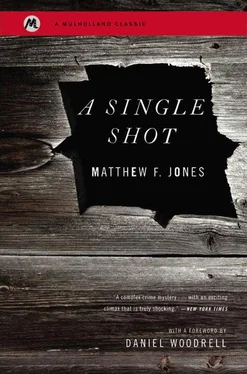John lies down next to the girl. He stares up at the ceiling and softly talks to her. He tells her he is sorry he shot her and that most of the time he believes it was an accident but occasionally, when he thinks about how angry the world sometimes makes him and how little he seems able to change things, he’s afraid it wasn’t. He tells her that when he was her age his only plan had been to marry the girl he loved, move her back to his family’s farm, be the best farmer he could be, and raise his children to do the same, and that his father’s having lost everything when John was sixteen crippled John the same as if he’d been in a car accident and lost the use of his legs. He tells her about the many failures in his life and that the only things in it worth holding on to are his wife and son, but that they had left him.
The body is bloated with gas. It occasionally burps or breaks wind. Sometimes it shifts on the mattress. When its right arm jerks out and hits John’s elbow, he stops speaking and gets up from the bed.
Standing over her, he apologizes for talking only about his problems when he at least was alive. He tells her that, no matter what else happens, he will try to find out her name and where she was from and that, if he succeeds, he will somehow notify her family about her death and let them know either where her body can be picked up or that she has received a proper burial.
He lifts up the cadaver, stiff with rigor mortis, and slides the plastic out from around it. He takes off the dead girl’s shoes and socks, then wrestles her out of her jeans and blood-soaked T-shirt. She isn’t wearing a bra. He pulls off her panties because they are soiled and wet. He drops everything into the plastic. Then he takes out his hunting knife. After rolling the cadaver onto its back and eyeballing the bullet’s course through the torso, he goes after the slug with his knife. He locates it just beneath the skin’s surface, embedded in soft flesh. He quickly cuts it out, then drops it onto the clothes.
He walks down the hall to the bathroom, picks up from the floor a towel and washcloth, dampens the latter with soap and water, then returns to the bedroom and spends several minutes scrubbing blood, sweat, and dirt from the cadaver. He sees no star-shaped birthmark; no scar on her knee; no blood-red bull’s-eyes. Far from being large and womanly, her breasts, surrounding the bullet hole, are small and girlish. She has almost no pubic bush. For these things alone, he is thankful.
He pulls on a pair of Moira’s rubber cleaning gloves, then from the floor takes one of her combs, a tube of red lipstick, black eyeliner, and blush. After combing several hair strands away from the dead girl’s forehead, he unties her ponytail, combs out the snarls, and catches the hair again in a rubber band. He applies the eyeliner and a thin gloss of lipstick. Still, he thinks, she is too pale. He dabs blush on her cheeks and, less so, her temples.
After tearing the tags from one of Moira’s panties and a T-shirt, he puts the underwear on the dead girl. He considers outfitting her in a blouse and skirt, but is afraid they might somehow be traced to Moira, so settles for a label-less pair of her jeans. He dresses the corpse one side at a time, using a hand to hold the rigid body upright and another to slowly thread a leg into the pants. It takes him close to half an hour. All the while, the cadaver makes noises and jumps. The smell starts to make him nauseous. He rolls up the jeans, slightly long on the dead girl, then snaps them. He puts her old socks and sneakers back on, then props the body in a mostly sitting position against the headboard. He pushes with his fingers at the corners of her mouth, removing some of its slackness.
Afterwards, he stands back to appraise her. He thinks she looks almost alive and that if she were, she’d be beautiful. He tells her so. Then he runs and gets the Polaroid. Eight shots remain in the camera. He uses them all in a dull light, taking her portrait from midchest up at three different angles. He lays the photographs on the bureau. Now he’s not sure what to do with the body. What would make things worse or better? And for which of them? A part of him feels as dead as the girl. He’s tired enough to fall over. He wonders if in the morning the sun will shine everywhere but on the trailer, and in that sliver of darkness the world will see what awful secrets he is hiding.
He crouches down, puts his arms beneath the girl’s knees and chest, and lifts her off the bed. Her unbending weight is staggering. That close to his nose, the smell nearly gags him. He labors with her over to the bedroom door, then down the corridor to the top of the basement stairs, where, after leaning her against the wall to switch on the light, he carts her down-cellar and over to the stand-up freezer, the door to which is open, its melting contents scattered on the floor. The compartment is just five feet high. To get the cadaver inside, he vigorously bends and twists it for several minutes, until finally there is the sharp snap of breaking bone and the body folds half-inward from the waist. John pushes it to the back wall, then stacks around and in front of it pieces of the butchered deer and snake so that, when he’s done, what is visible of the cadaver is nearly indistinguishable from the rest of the meat.
Upstairs, he wraps the girl’s old clothes, the bloody sheets and towels, the note, and the rubber gloves in the plastic strip, then takes the plastic out to the incinerator and burns it. He hurls the slug deep into the woods. He enters the woodshed. His tools are on the floor among garden mulch and fertilizer from several sliced-open sacks and rock salt from a tipped-over fifty-pound barrel. He shovels the mulch and fertilizer into trash bins and the rock salt back into the barrel, then rearranges the tools exactly as they had been.
He goes back outside and crawls beneath the shed, where the sack is still attached to the fourth beam. He unties it, carries it into the trailer, dumps the money on the floor, and tries to count it, but after reaching eighty thousand dollars loses his place. He is too tired to start over. He thinks that even if he were to give the money back to the thieves, they would kill him, especially if it came from Ira Hollenbach’s. And if he handed it over to the law, he would implicate himself in at least one death. He puts the money back in the sack, carries it outside, and ties it beneath the truck bed, between the axle and one wheel.
He spends over two hours cleaning up the trailer, repairing what he can, and putting most of his and Moira’s belongings back where they had been. With the dead girl there, he thinks he won’t sleep, but he does. He turns on the television set, lies on the couch, and for less than five minutes watches the horizontally distorted images of a man shooting a pistol at a giant fly.
The unrestful dead, those who have not by their loved ones been laid to earthly rest, inhabit the trees, bushes, birds, and animals of the mountainside. Their eyes are the sun and moon; when one shuts, the other opens. Their words are the stars. Their sadness the clouds. Their fingers the wind. They watch, talk, and touch, but are not felt by the living…
HE WAKES, in a cold sweat, to the sound of shattering glass. Sensing another’s presence, he lies there in the still-dark morning anticipating a gunshot, a black shadow, or the touch of cold steel against his neck, but hears only the tick of the living-room clock and, through the screened windows, a light wind moving the trees.
Had he been hallucinating? Or dreaming? If he hadn’t, and in a second was killed, would he come face-to-face with the dead girl? Would she forgive him? Would her soul in the afterlife be as beautiful as her body in death? He pictures a place following life—a wood-paneled bar maybe, playing soft country music—where souls, good and bad, dance a few slow ones and reminisce before receiving their permanent assignments to heaven or hell. A place where life’s hatchet is buried and all drink to eternity. He remembers his father, reduced to skin and bones, after wordless weeks, rousing himself to scream at the visiting Pastor McLean, “Weren’t never your call, Reverend! Was mine! Now it’s His!”
Читать дальше












